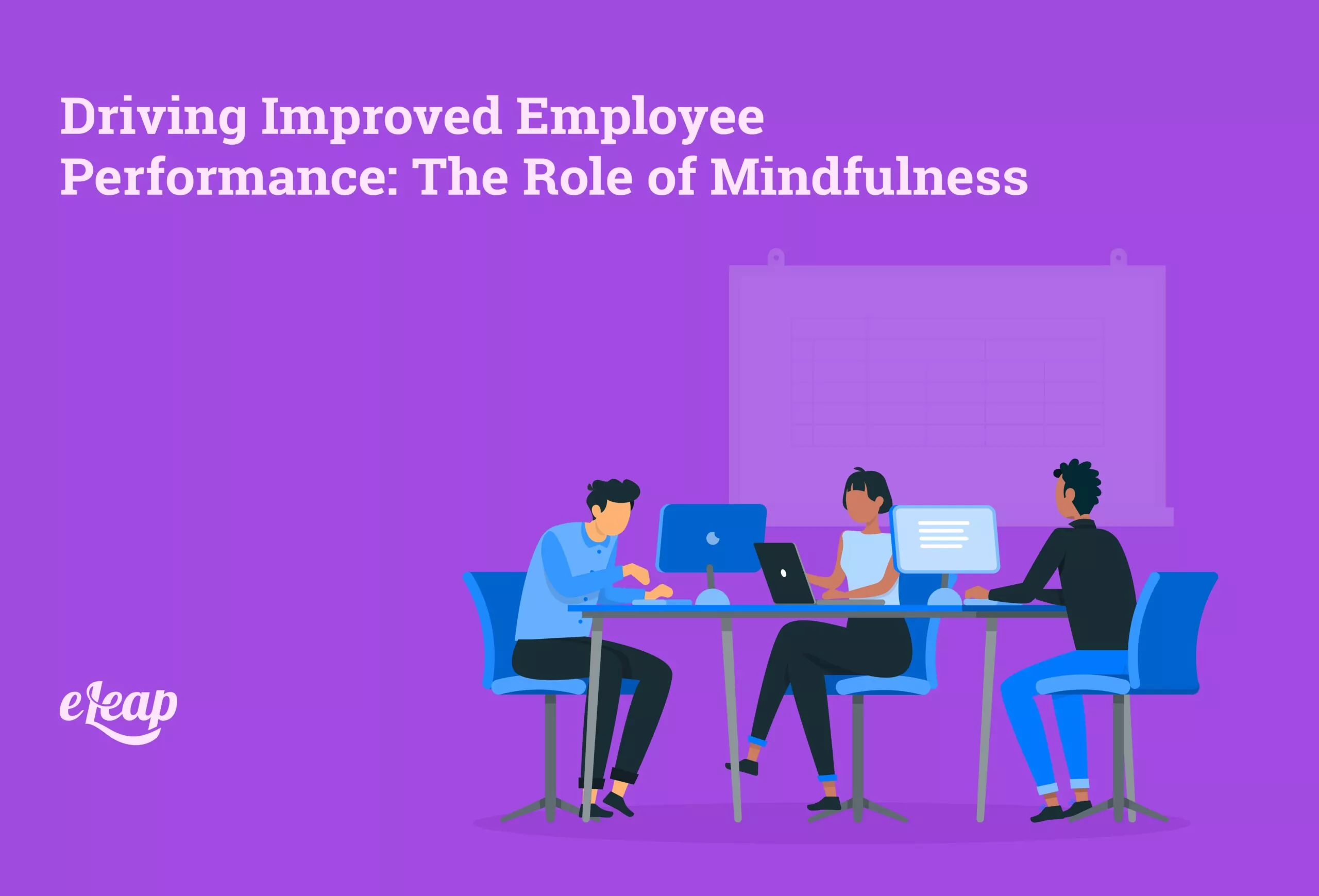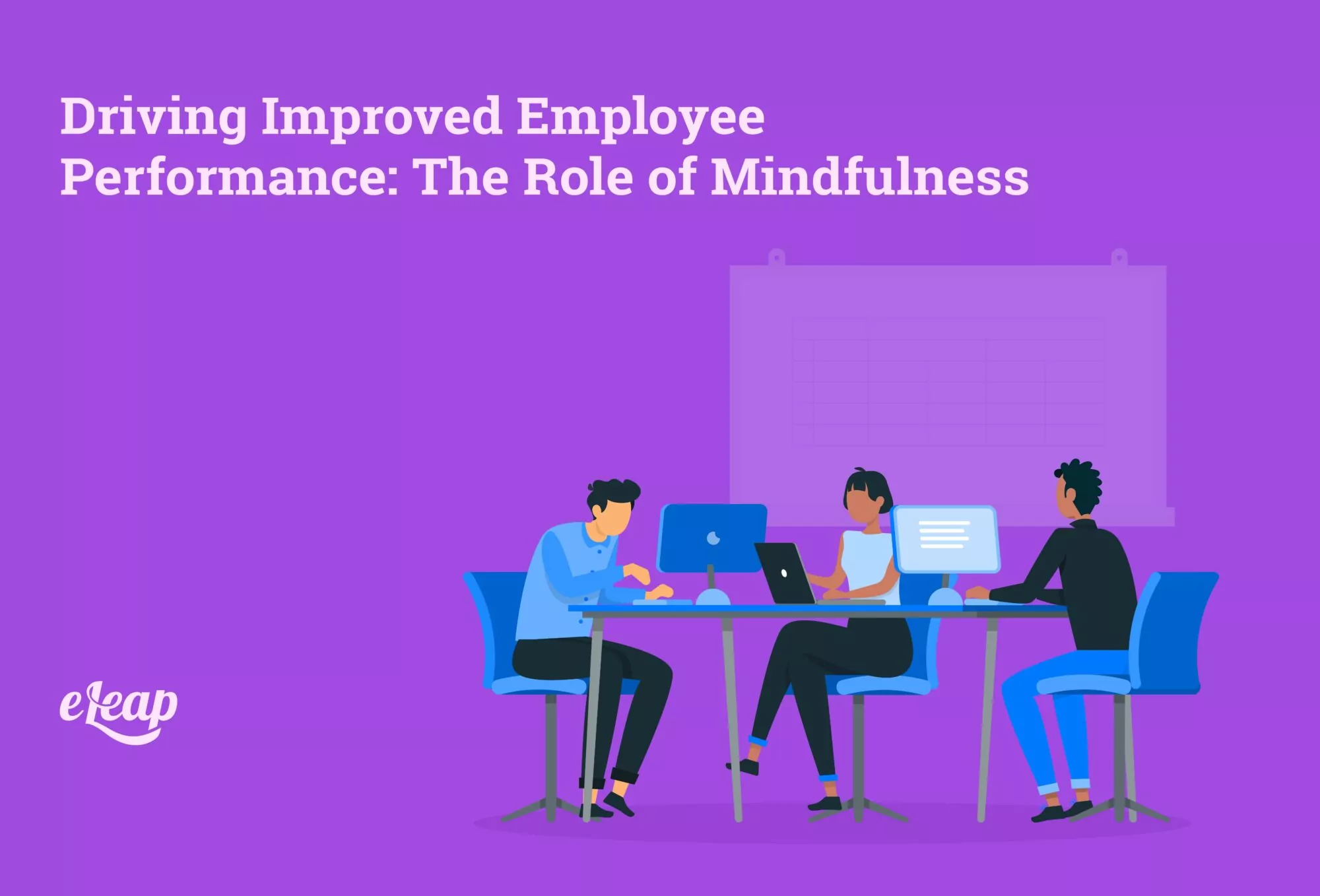Driving Improved Employee Performance: The Role of Mindfulness

Improving employee performance can be a frustrating process. Gone are the days when an annual performance review and a threat of punitive action could scare employees into working harder. Today, leaders understand that driving improved employee performance requires a commitment to ongoing communication, skills development and growth, and providing the support employees need to do their best work.
However, there is one tool that you may have overlooked here. Mindfulness – a technique derived from traditional Buddhist meditation – can play a pivotal role in helping employees embrace their jobs and perform better. In this post, we will explore what mindfulness is and what role it might play in your performance management efforts.

What Is Mindfulness?
To quote the Zen master Thich Nhat Hanh, “I define mindfulness as the practice of being fully present and alive, body and mind united.” Ultimately, it is nothing more than paying attention to what you’re doing, feeling, seeing, and hearing in a particular way without any interpretation or judgment about whether it is good or bad.
For instance, you look out the window and see that it’s raining. Without mindfulness, you might automatically think something like, “Great, it’s raining. Now I won’t be able to get my afternoon walk in. That’s so frustrating – I really needed the break. And I’ll bet the driveway’s going to be flooded, so when I bring the bags in from the car, I’m going to make a huge mess in the house.”
Someone practicing mindfulness, on the other hand, would simply note that, “It’s raining.” It’s about being aware but not overwhelmed or reactive. Mindfulness is empowering and uplifting, calming, and focusing.
How Mindfulness Affects Employees
By this point, you might be thinking, “Great, it sounds like mindfulness can help people deal with stress. However, I don’t really see a correlation to improved performance in the workplace.” That is understandable, particularly given our society’s focus on “knuckling down and just working harder”. However, the truth is that mindfulness can have profound effects on your employees’ performance level.
Calmness, Patience, and Resilience
The focus of mindfulness is on being completely present in the here and now without judging. It’s about being calm despite external pressures, and not worrying so much about what the future might bring. That might sound like it would demotivate employees, and, in truth, it does limit fear-based productivity and stress-related increased performance.
For instance, when an employee is fearful about tomorrow – a looming deadline, for instance – they create a flurry of activity in a push to get the project done on time. Mindfulness practice does away with that sense of worry, thereby eliminating the possibility of a last-minute push to complete the project. Superficially, that seems to indicate that mindfulness could actually damage performance, but the truth is radically different when you stop and look deeply.
Someone who regularly practices mindfulness meditation is calmer and more patient. Those qualities help them deal with daily stressors better, allowing them to be more productive each moment of the day. Chances are very good that someone who is practicing mindfulness would not find themselves in a situation in which they face a looming deadline and need to make a last-minute push to complete a project, because they would not have experienced the stress and worry that makes people procrastinate and put big projects off in the first place.
Mindfulness also helps develop resilience in your employees. This is that particular quality that allows your people to “bounce back” from negative events and occurrences, both on the job and in their personal lives. More resilient employees have less downtime due to those negative events and can perform at a higher level throughout their employment, with fewer peaks and troughs.
Improved Focus
Another benefit of mindfulness practice is that it helps employees develop better focus. We’re firmly within the Digital Age, but it might be better termed the Age of Distraction. Disruptions abound that weren’t issues even just a decade ago – smartphone notifications, increasing political polarization, email alerts, text messages, and more.
If left unaddressed, those disruptions can lead to distraction. Employees lose a lot of time each day simply clearing notifications from their devices, much less replying to text messages, answering emails, or commenting on social media posts. With mindfulness practice, employees can develop better focus. This allows them to home in on what they are doing and exclude distractions that create time sucks.
Acceptance of Criticism
A lot of focus today is placed on delivering constructive criticism to help employees improve and develop. However, sometimes, innate defensiveness means that even constructive criticism can be viewed as an attack. Mindfulness practice can change that paradigm, helping your employees not just accept feedback, but to see it for what it is and embrace it. They are much more likely to act on it this way, as well, thereby driving improved performance simply through acceptance.
Improved Interpersonal Skills
For your team to perform at its peak, it needs to act as a cohesive whole. That requires good interpersonal skills, like listening, empathy, compassion, and introspection. Mindfulness has proven to help develop the region of the brain associated with those qualities, helping to build stronger interpersonal and relationship skills.
The basis of business success is not a product or service. Your employees can form strong relationships. Mindfulness helps develop an enhanced awareness of the world within and without, providing employees with the ability to be a more valuable part of the team and to create stronger relationships that foster better performance across the board.
Go for Mindfulness
As you can see, there’s a lot to be gained from practicing mindfulness. Even just a few minutes each day spent in mindfulness meditation can have a profound impact on performance, morale, engagement, and other factors critical to business success. The take away here is this – encourage your employees to use mindfulness practice every day. It helps if you lead by example, too. And, when everyone is more mindful, you’ll find that the whole organization benefits.